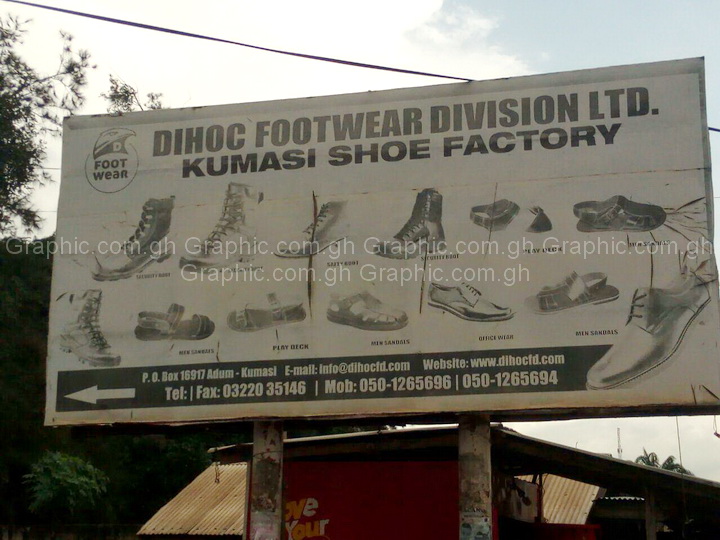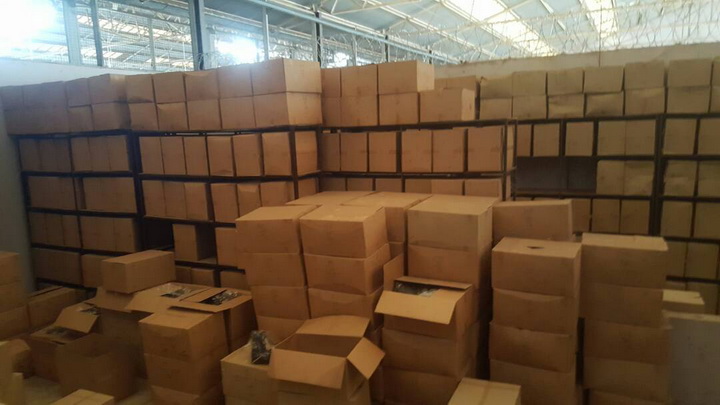
Kumasi Shoe Factory in limbo as security agencies refuse to patronise boots
The refusal of state security agencies to patronise the boots and shoes produced by the DIHOC Footwear Division Limited (formerly Kumasi Shoe Factory) is negatively affecting the operations of the company.
The agencies — the Ghana Armed Forces (GAF), the Ghana Police Service, the Ghana National Fire Service (GNFS), the Ghana Prisons Service and the Ghana Immigration Service — are said to have resorted to the importation of boots and shoes from China and India.
Since 2015, DIHOC, which is jointly owned by the GAF and a Czech Republic-based company, Knights a.s, has not received orders from any of the state security agencies.
Compounding the woes of the company is the fact that since 2014, combat boots bought from the company by the GAF on behalf of the Ghana Navy have not been paid for.
The inability of the GAF to settle their indebtedness, coupled with DIHOC’s huge stock, has made it extremely difficult for the management of the company to continue to produce boots and shoes, leading to the loss of over 60 per cent of its workforce.
Visit
When the Daily Graphic visited DIHOC last Friday, work had slowed down because boots and shoes which had earlier been produced for the security agencies were still yet to be purchased.
Speaking to the Daily Graphic, the Chairman of the Board of Directors of the company, Dr Karl Laryea, said he was hurt that despite assurances from the government to support the factory, nothing concrete had been done about that promise.
“A lot of investment has gone into the company since it was resuscitated in 2012, following a joint venture partnership between Knights a.s, acting by and through its subsidiary, Knight Ghana Limited, and DIHOC, owned by the GAF,” he said.
He said the lack of commitment from the security agencies was making it difficult for the company to undertake further projects.
“Here is the case that the GAF, our own partners, are importing from other countries. They buy from companies and pay them but when it comes to DIHOC, the case is entirely different,” Dr Laryea said.

Unfair competition
He explained that shoes imported into the country, which were inferior in quality to those produced by DIHOC, were being sold to the security agencies at cheap prices.
“This is what happens — when the goods arrive, the shoes are under-invoiced, get cleared for a small tax and later over-priced for the market.
“Even though the selling price is doubled, the shoes are still cheaper, compared to those from DIHOC, which pays so much tax on the raw materials to produce in the country,” Dr Laryea explained.
For instance, he said, a safety Chinese shoe bought at eight dollars could be priced for one dollar to attract a minimum tax at the port but after it was cleared, the amount would be raised to about $20 and sold on the Ghanaian market.
“We cannot compete with such companies because it costs them little to get the shoes onto the market, compared to shoes made by DIHOC,” Dr Laryea said.
He said the company could not under-invoice the raw materials imported for production because of the import declaration form (IDF) number and other required documents being used in the system.
He said apart from paying huge taxes on imported materials, the company paid so much in electricity bills.
“Even though we are not doing much work, our electricity bills have increased from GH¢3,000 GH¢9,000 monthly. All this, in addition to the production cost, makes our shoes appear more expensive than those inferior ones imported,” he added.
![]()
Possible measures
Outlining some of the measures that could be implemented to address the challenges facing the company, Dr Laryea suggested that the government could give a policy directive by which all government agencies, particularly the security agencies, would be required to buy from DIHOC to promote job creation.
“If this happens, the company could produce about 120,000 pairs of security boots and shoes for the security agencies. With that, it can break even and expand,” he said.
He also advocated a directive from the Ministry of Education for pupils and students in public schools to wear made-in-Ghana sandals.
“With that policy in place, you would have created markets not only for DIHOC but also the entire local shoe industry in Ghana,” he said.
Such a policy, he explained, would create a market where about five million pairs of sandals could be produced annually, adding: “This is how to create jobs for the people and not allow an existing company to shut down and collapse.”
He appealed to the government to intervene in the operations of the factory, else it would be difficult for it to attain its desired targets.
Response
When contacted, the Public Relations Officer of the GAF, Col Aggrey Quarshie, said he could only address the issue when the Daily Graphic submitted a formal letter requesting for information on the shoe factory.
With the police, the Director of Public Relations at the Police Headquarters, Assistant Commissioner of Police (ACOP) Mr David Eklu, said it was not a deliberate attempt by the police not to buy shoes from the factory.
“We buy shoes through the government and sometimes we buy in bulk, so it takes a while before we order for new supplies. We also invite companies to come and showcase their products for to see if they would meet our standard first before we proceed to do business,” he said.
Asked whether the police had bought any shoes from the company to enable them to determine the quality of the shoes, Mr Eklu said: “I do not have that information right now.”
The Deputy Public Relations Officer of the GNFS, Prince Billy Anaglate, said the service had never ordered any boots because the government had not asked it to do so.
The Public Relations Officer of the Ghana Prisons Service, Mr Vitalis Aiyeh, said he had to contact the Procurement Department of the service to know the facts before commenting on the story.
